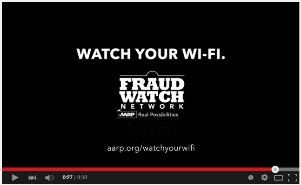AARP Hearing Center
Boise, ID—A new survey of internet users shows that the freedom and convenience of public wireless networks may come at a cost. Nearly half failed a quiz about online and wireless safety, and the survey results indicate that thousands nationwide are engaging in activity that could put them squarely in the sights of hackers looking to steal their personal information.
An AARP Fra

The survey results unveil a high incidence of risky online behaviors:
- Among those who say they use free public Wi-Fi, more than a quarter of respondents (27%) say they have banked online via public Wi-Fi in the last three months.
- Similarly, 27% of those who use free public Wi-Fi have purchased a product or service over public Wi-Fi using a credit card.
- 26% of smartphone users do not use a passcode on their phones.
- 61% do not have online access to all of their bank accounts.
- Among those who have set up access to all or some of their online banking accounts, almost half (45%) say they have not changed their online banking passwords in the past 90 days. Experts say that online bank account passwords should be changed every 90 days.
Nearly half of survey respondents (45%) failed a quiz about online and wireless safety. Approximately 40% of respondents were not aware that:
- It is NOT okay to use the same password on more than one site even if it contains a complex mix of letters, numbers and symbols.
- Even if you are not using the Internet, if you’re in a location with a public Wi-Fi network, you should disable your wireless connection.
- It is NOT safe to access websites with sensitive information, such as banking or credit cards, while using a public Wi-Fi network, even if the website is secured by https.
More than 8 in 10 (84%) people surveyed did not know that the most up-to-date security for a home Wi-Fi network is NOT WEP -- Wired Equivalent Privacy. Experts advise using at least WPA2 wireless encryption for better protection.
“The Fraud Watch Network’s “Watch Your Wi-Fi” campaign is giving people the information they need to stay connected without sacrificing their personal security,” said Shadel.
A newly launched FWN cyber scam website features “ Four Things Never to Do on Public Wi-Fi:”
1. Don’t fall for a fake: Con artists often set up unsecure networks with names similar to a legitimate coffee shop, hotel or other free Wi-Fi network.
2. Mind your business: Don't access your email, online bank or credit card accounts using public Wi-Fi.
3. Watch your settings: Don't let your mobile device automatically connect to nearby Wi-Fi.
4. Stick to your cell: Don’t surf using an unknown public network if the website requires sensitive information - like online shopping. Your cell phone network is safer.
Consumers may also visit the new website to learn about three scams frequently associated with public Wi-Fi, including the “man-in-the-middle attack,” an “evil twin” ruse, and the “war driving attack.”
For additional information, including a video demonstrating the risks of unsecure Wi-Fi, visit the AARP Fraud Watch Network.































































